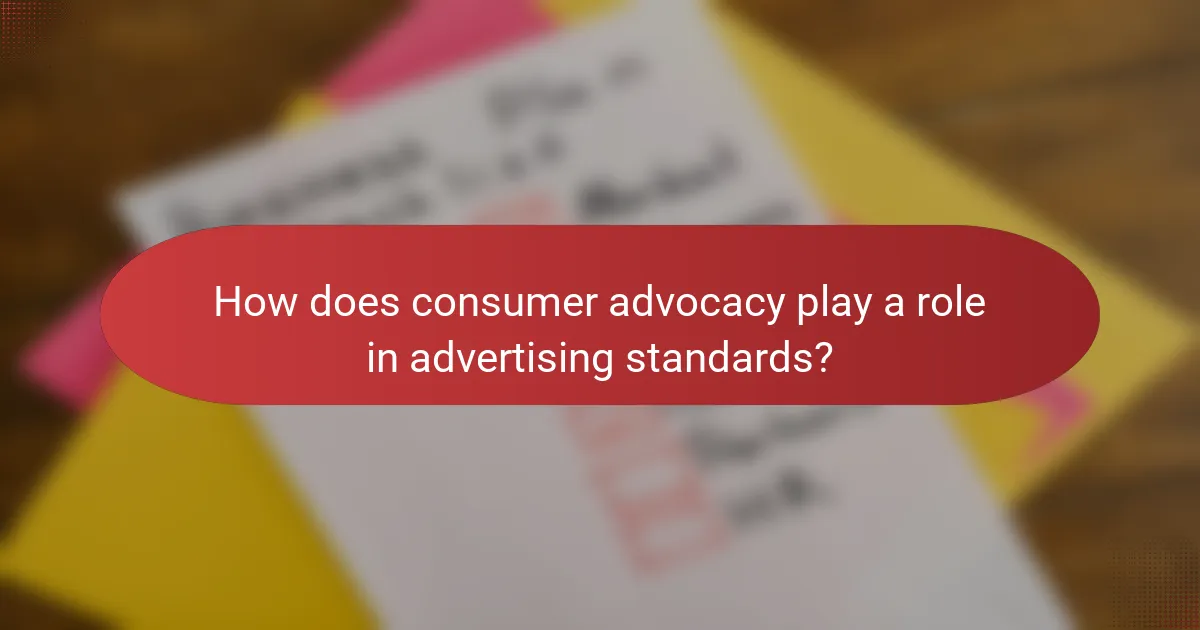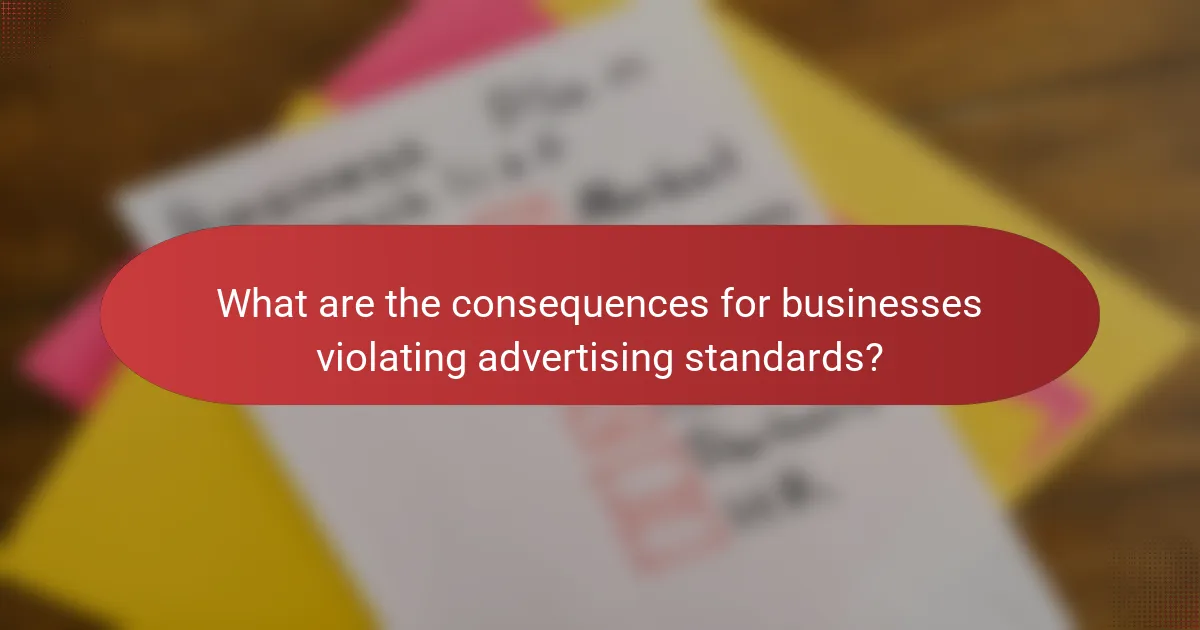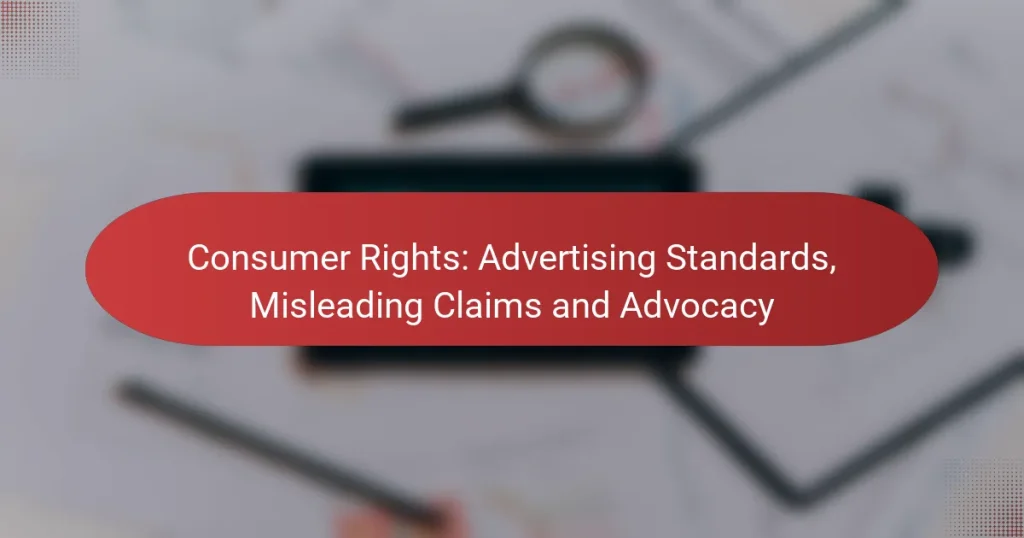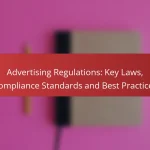Consumer rights in South Africa are safeguarded by the Consumer Protection Act, which mandates truthful advertising and protects individuals from misleading claims. By recognizing vague language and exaggerated benefits in advertisements, consumers can make informed decisions and avoid deceptive marketing practices. Additionally, consumers have the option to file complaints and seek legal recourse against misleading advertisements, ensuring accountability from advertisers.

What are consumer rights regarding advertising standards in South Africa?
In South Africa, consumers have the right to truthful advertising and protection from misleading claims. The Consumer Protection Act ensures that advertisements are not deceptive and that consumers can make informed choices based on accurate information.
Protection against misleading advertisements
Consumers are protected from misleading advertisements that can distort their understanding of a product or service. This includes false claims about quality, price, and benefits. If an advertisement is found to be misleading, consumers can report it to relevant authorities.
For example, if a product is advertised as “100% organic” but contains synthetic ingredients, this could be deemed misleading. Consumers should always verify claims and seek clarity when in doubt.
Regulatory bodies overseeing advertising
In South Africa, the Advertising Standards Authority (ASA) is the primary body responsible for regulating advertising practices. The ASA ensures that advertisements comply with established standards and can investigate complaints from consumers.
Additionally, the Consumer Goods and Services Ombud (CGSO) plays a role in addressing consumer complaints related to misleading advertising. Consumers can approach these bodies for guidance and to report any deceptive practices they encounter.

How to identify misleading claims in advertising?
To identify misleading claims in advertising, look for vague language, exaggerated benefits, or lack of evidence supporting the claims. Understanding these elements can help consumers make informed decisions and avoid deceptive marketing practices.
Common signs of misleading claims
Misleading claims often include phrases like “best,” “guaranteed,” or “scientifically proven” without clear evidence. Ads that use fine print to limit offers or obscure important details can also be red flags. Additionally, testimonials that lack context or are not representative of typical results may indicate deception.
Another common sign is the use of ambiguous terms that can be interpreted in multiple ways. For instance, “natural” does not always mean safe or healthy, and “low-fat” can still refer to products high in sugar. Always question the clarity and specificity of the language used in advertisements.
Legal definitions of misleading advertising
Legally, misleading advertising is defined as any advertisement that contains false or deceptive statements that could mislead a reasonable consumer. In many jurisdictions, including the United States and the European Union, regulations require that claims be substantiated and not misleading in their presentation.
For example, the Federal Trade Commission (FTC) in the U.S. enforces laws against misleading advertisements, requiring that any claims made must be backed by evidence. Similarly, the EU has strict guidelines that protect consumers from misleading marketing, ensuring transparency and honesty in advertising practices.

What actions can consumers take against misleading advertisements?
Consumers can take several actions against misleading advertisements, including filing complaints with relevant authorities and seeking legal recourse. Understanding these options is crucial for protecting consumer rights and ensuring accountability from advertisers.
Filing complaints with the Advertising Standards Authority
Consumers can file complaints with the Advertising Standards Authority (ASA) if they believe an advertisement is misleading or harmful. The ASA reviews complaints and can require advertisers to amend or withdraw misleading ads. This process is typically straightforward and can often be done online.
When filing a complaint, it’s important to provide clear evidence of the misleading claims. This can include screenshots of the advertisement, details of where and when it was seen, and an explanation of why it is misleading. The ASA aims to resolve complaints quickly, often within a few weeks.
Seeking legal recourse for false advertising
If a misleading advertisement has caused significant harm or financial loss, consumers may consider seeking legal recourse. This can involve filing a lawsuit against the advertiser for damages. Legal action can be complex and may require the assistance of a lawyer experienced in consumer rights and advertising law.
Before pursuing legal action, consumers should evaluate the potential costs and benefits. Legal fees can be substantial, and outcomes can vary. In some cases, it may be more effective to pursue a settlement or to work through consumer protection agencies first.

What are the key advertising regulations in South Africa?
In South Africa, key advertising regulations are primarily governed by the Consumer Protection Act and the Code of Advertising Practice. These regulations aim to protect consumers from misleading claims and ensure that advertising is truthful and fair.
Consumer Protection Act provisions
The Consumer Protection Act (CPA) establishes a framework to promote fair, accessible, and sustainable marketplace practices. It prohibits misleading advertising, ensuring that all claims made by businesses are substantiated and not deceptive.
Under the CPA, consumers have the right to receive accurate information about products and services, allowing them to make informed choices. Businesses must avoid false representations and disclose all relevant information, including pricing and terms of sale.
Code of Advertising Practice
The Code of Advertising Practice sets out specific guidelines for advertisers to follow, ensuring that advertisements are legal, decent, honest, and truthful. It emphasizes the importance of not misleading consumers through exaggerated claims or ambiguous language.
This code includes provisions on comparative advertising, where businesses must ensure that comparisons with competitors are fair and substantiated. Advertisers should also be cautious about targeting vulnerable groups, ensuring that their messaging does not exploit consumers’ lack of knowledge or experience.

How does consumer advocacy play a role in advertising standards?
Consumer advocacy is crucial in shaping advertising standards by ensuring that claims made by companies are truthful and not misleading. Advocacy groups work to hold businesses accountable, influencing regulations that protect consumers from deceptive marketing practices.
Organizations promoting consumer rights
Numerous organizations focus on promoting consumer rights, such as the Federal Trade Commission (FTC) in the United States and the European Consumer Organisation (BEUC) in Europe. These entities provide resources, guidance, and support for consumers facing misleading advertising.
Additionally, non-profit organizations like Consumer Reports and the Better Business Bureau (BBB) offer platforms for consumers to report misleading claims and seek redress. These organizations often conduct research and publish findings that help inform consumers about their rights and the standards they should expect from advertisers.
Impact of advocacy on policy changes
Consumer advocacy has a significant impact on policy changes related to advertising standards. By raising awareness of misleading claims, advocacy groups can prompt regulatory bodies to revise existing laws or create new regulations that better protect consumers.
For example, campaigns led by consumer advocates have resulted in stricter guidelines on health-related claims in advertising, ensuring that companies provide evidence to back up their assertions. This kind of advocacy not only enhances consumer protection but also encourages businesses to adopt more transparent marketing practices.

What are the consequences for businesses violating advertising standards?
Businesses that violate advertising standards face significant consequences, including financial penalties and damage to their reputation. These repercussions can lead to a loss of consumer trust and long-term impacts on sales and brand loyalty.
Fines and penalties imposed
Violating advertising standards can result in fines that vary widely based on the severity of the infraction and the jurisdiction. In many countries, penalties can range from hundreds to thousands of dollars, and in severe cases, businesses may face legal action or injunctions against their advertising practices.
For example, in the European Union, misleading advertisements may incur fines up to 4% of a company’s annual revenue. In the United States, the Federal Trade Commission (FTC) can impose penalties for deceptive advertising, which can also escalate based on the frequency and nature of the violations.
Reputational damage and consumer trust
Reputation is crucial for any business, and misleading advertising can severely damage consumer trust. Once consumers perceive a brand as dishonest, regaining their confidence can take considerable time and effort, often requiring extensive marketing campaigns to rebuild credibility.
Moreover, negative publicity from advertising violations can lead to a decline in customer loyalty and sales. Companies may find themselves facing backlash on social media or in the press, which can further exacerbate the damage to their reputation. It is essential for businesses to prioritize transparency and honesty in their advertising to maintain a positive public image.

What are emerging trends in consumer rights and advertising?
Emerging trends in consumer rights and advertising focus on increasing transparency and accountability in marketing practices. As consumers become more informed, businesses are adapting to meet higher expectations regarding honesty and ethical advertising.
Increased scrutiny of digital advertising
Digital advertising is facing heightened scrutiny from regulators and consumers alike. This includes a closer examination of data privacy practices and the accuracy of claims made in online ads. Companies must ensure that their digital marketing strategies comply with relevant regulations to avoid penalties.
For example, misleading claims about product effectiveness or false endorsements can lead to significant backlash and legal consequences. Businesses should regularly review their advertising content to ensure it aligns with current standards and consumer expectations.
Consumer awareness and education initiatives
Consumer awareness initiatives are crucial in empowering individuals to recognize misleading advertising practices. Organizations and governments are increasingly providing resources to educate consumers about their rights and how to identify deceptive claims.
These initiatives may include workshops, online courses, and informational campaigns. For instance, consumers are encouraged to report misleading advertisements to relevant authorities, which can help enforce advertising standards and protect others from similar experiences.


